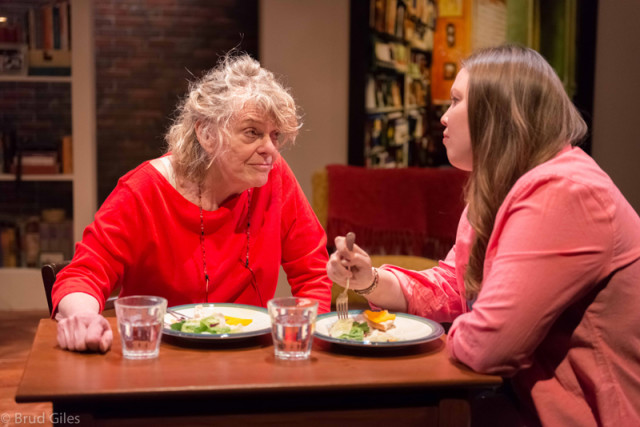Portland Playhouse’s 'After the Revolution': So You Want to Be a Commie?

Vana O'Brien and Jennifer Rowe
Image: Brud Giles
Playwright Amy Herzog turned such a revelation in her real life into the compelling drama After the Revolution. The 2010 play won her the New York Times Outstanding Playwright Award and set her on course to becoming one of New York’s hottest young playwrights. Although she’s since been nominated for a Pulitzer, this is the first local production of her work—and a simmering one it is.
The Joseph family is the kind of ardent Marxists who make political speeches before dinner and move a Fidel portrait from the bedroom to the living room so more people can see it. The play opens on the family members gushing over their newest political star: Emma Joseph (Jennifer Rowe). The freshly minted lawyer is taking up the family’s fight against social injustice by directing an activist organization named for her grandfather Joe Joseph—the deceased patriarch the family reveres absolutely as a political hero who wouldn’t waiver from his beliefs, even under the oppressive McCarthyism bullying of the 1950’s, which ultimately led to him being blacklisted.
This reverential atmosphere shatters when the family gets word of an impending book that fingers Joe Joseph as not only a member of the Communist Party, but an actual spy who supplied information to the Soviets during World War II.
The revelation throws Emma, a previously unquestioning idealist, into an existential tailspin of cigarettes and unanswered phone calls. To make matters worse, this secret was not so secret to other members of her family, who kept it from her. Morals, politics, and family loyalties get thrown into question as Emma begins to distrust everything she’s grown up around, even at the expense of her relationships and career.
Directed by Tamara Fisch, who helped develop the play at the Williamstown Theatre Festival, Portland Playhouse puts on a stirring family drama with enough thought-provoking, philosophical meat to make a feast.
After the Revolution
Portland Playhouse
Thru June 1The ensemble is strong, playing earnest, sometimes-wrongheaded liberals that Portlanders will recognize well, if not in themselves, then in their friends and neighbors. As Emma’s father, Duffy Epstein shoulders much of the play’s emotional weight, unable to reconcile his unwavering support for his father and the emotional backlash from his betrayed daughter. Lorraine Bahr moves with the seaweed-motion of dancers at a Grateful Dead concert as Emma’s hippy-dippy stepmother who maintains one of the clearer views despite one too many gins. And Vana O’Brien gets the most laughs as Emma’s grandmother, who simultaneously apologizes for Stalin and wishes Emma would settle down with a nice, book-loving Jew
The play’s weakness lies in the character of Emma herself. Her unflagging idealism feels too rigid to be believable—to say nothing of her rather absurd descent into doubt—a problem Jennifer Rowe’s performance didn’t overcome on opening weekend.
Herzog balances the script’s sometimes heavy-handed political invocations with enough smart humor to keep it moving briskly. Ultimately, the declension of the family dynamic, and the uncertain resolution the characters eventually find, inundates itself to problems we all have.
Good and evil are not presented in black and white terms, but rather as perspectives from a particular point of view. Generational and racial questions are tackled (often humorously, particularly in the case of the family’s cluelessly racist treatment of Emma’s Hispanic boyfriend) by characters trying to promote their beliefs while maintaining their family life. When battle lines are drawn, can beliefs shift, yet dynamics stay the same?
Real-life conclusions were just as ambiguous, as we learned following Sunday’s matinee when Herzog’s aunt and uncle appeared for a Q&A. Although much of the play came from Herzog’s imagination, there was a seed of truth in that her grandfather was ousted in a book for being a Soviet spy during World War II, and her father did hide the fact from her for many years. Seeing that same father on the stage speaking of his own experiences and hardships, it became all too easy to shift your point of view. Truth can only be determined through an examination of the facts, but when history is only written by the victors, can morality of actions be wholly ascertained? The play left this question open; perhaps only hoping to make people ask.




